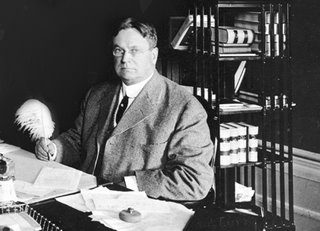Hiram Johnson

Hiram W. Johnson, a Republican governor of California (1911-17) and U.S. senator (1917-45), was born on this day in 1866 in Sacramento, California.
The son of a corporate lawyer, Johnson achieved renown as a stem-winding assistant prosecutor in a case against a corrupt labor boss -- a case he inherited when his predecessor was shot in open court. As the Republican candidate for governor of California in 1910, his hard-driving, florid oratory and progressive "reform" views succeeded in getting him elected, whereupon he promised to kick big corporate interests such as Southern Pacific Railroad out of politics, and urged the adoption of state constitutional amendments which would permit recall elections of state officials and legislation by popular referenda (mechanisms which would ultimately help propel the political careers of Howard Jarvis and Arnold Schwarzenegger).
In 1912, he left the Republican Party to join Theodore Roosevelt as running mate on Roosevelt's "Bull Moose" presidential ticket, but after their defeat he rejoined the Republicans and won election to the U.S. Senate. In the Senate, he was one of the leading voices of isolationism. He reluctantly supported U.S. involvement in World War I, but broke away from the Republican establishment to speak out against the League of Nations.
He ran hard for the Republican nomination for president in 1920, entering the convention a close second behind Major General Leonard Wood, running against American intervention in foreign affairs and against the "international bankers" who had seduced both Republicans and Democrats into believing that intervention was America's destiny. But shortly into the convention, his support dwindled (especially after Charles Wheeler, in his nominating speech for Johnson, accused the convention of being packed with delegates who were "political slaves" hand-picked by the party bosses). As the convention deadlocked, the Republican leaders met in a suite in a hotel in Chicago, the quintessential "smoke-filled room," and picked Warren Harding as a compromise candidate, a turn of events Johnson bitterly denounced.
He continued to be popular in California, however, and used his weight as an independent Republican to support Franklin Roosevelt over Herbert Hoover in 1932. Turning down Roosevelt's offer to become secretary of the interior, Johnson was initially a New Deal supporter, but turned against Roosevelt as he stepped up aid to the Allies in Europe prior to World War II. The attack on Pearl Harbor convinced him that he had to support American entry into the war, but he continued to strenuously object to American participation on the world stage.
Johnson died on August 6, 1945 in Bethesda, Maryland -- ironically, on the same day that the atomic bomb was dropped on Hiroshima, the moment when U.S. involvement on the world stage would thereafter be a certainty.





0 Comments:
Post a Comment
Subscribe to Post Comments [Atom]
<< Home